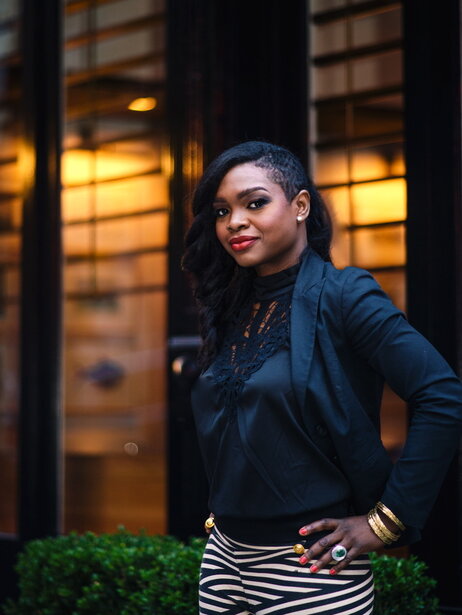by PATRICK JARENWATTANANON

Camille Thurman (left), Mimi Jones (center) and Shirazette Tinnin all released new albums this week on Hot Tone Music, Jones’ record imprint. Courtesy of the artist.
This past week, the bassist and vocalist Mimi Jones released three albums at once. They weren’t all her music, but they were her work: As the founder and producer of the record label Hot Tone Music, she brought all three albums to fruition.
Jones has been on the New York City scene for nearly two decades; Balance is her second album as a bandleader. Her labelmates, however, are newer to the area. Drummer Shirazette Tinnin recently moved east after years in Chicago; her new album is called Humility: Purity of My Soul. Born in 1986, saxophonist and vocalist Camille Thurman is a native of the city, but only decided to pursue music full-time after earning a college degree in Geological and Environmental Sciences; her new album is called Origins. Both Tinnin and Thurman are putting out their debut recordings.
Hot Tone Music is not a collective — each artist brought her own individual concepts and performing career to the table. But having pulled together Kickstarter campaigns and cutting package deals with publicists, recording engineers, photographers and graphic artists, Hot Tone Music is a collectively operated enterprise. “In a sense, this release is sort of a celebration that if you can come together as a community, you can get it done, and everybody wins,” Mimi Jones told me over the phone.
Pictured together, the three bandleaders also cut a striking profile: All three are black female instrumentalists, curiously among the least visible intersections of today’s jazz community. Wondering if this was a conscious decision — and about the modernity heard on all three records — I gave Jones a call to talk about her fledgling label and her music. We discussed the origins of Hot Tone, her first big break and the lingering issues around “Women in Jazz.”
Patrick Jarenwattananon: In your own words, why did you decide to start this label?
Mimi Jones: Basically, in the last few years, I had been approaching a few different labels and getting denied. For a musician, that’s kind of hard, because we look for opportunities to present our art, and we look to use our art as our livelihood. So it’s really important. It’s not just like, ‘Wow, I got signed!’ It’s a big deal, and so a lot of effort goes into that.
I just got tired of that, and I thought, ‘It’s gonna be half a century until I get signed!’ So I just realized, you have all the resources that you need to do it, you just need the energy, and need to ask for help and get up and do it.
One of the most salient features is that the three artists that you’ve chosen to present all at once: Not only are they all women, but they’re kind of a demographic minority within the [contemporary] jazz community, being black female instrumentalists, largely. Was that conscious?
Um, I feel like it was a dual consciousness? The way it came about was that they were just my friends. And I have friends of all nationalities, but those two had reached out for my help. Shirazette had just graduated from [Northern Illinois University] and moved to New York with her Master’s degree. She wanted to do more jazz, and she wondered how she could get on the scene and become more popular. The same with Camille: She had just graduated from [SUNY-Binghamton] with a geology degree or something, and she decided she wanted to pursue music, and she was asking, ‘How do you do this?’
And for a long time I would just have them over for dinner — musicians never turn down food — so we would sit around and talk about what they needed. And when it got to the part that, ‘You need a record — that’s your passport. No one wants to know anything [about you] unless you have something to show for it that looks good and sounds good.’ And because I had just done it myself, I felt like, ‘I could just tell you everything you need to do, and I could come in the studio and help you.’ … I actually asked them, ‘Would you like to be on this label?’ And they were like, ‘We would love to do it.’
So that’s how it happened. It wasn’t like, ‘OK, I’m gonna pick two black women instrumentalists.’ And actually, there were some guys who were involved, as well, but their CDs weren’t done in time.
But on the flip side, part of the label is based on my story. You may have someone who is a star — not to toot my own horn! — but they go unnoticed because either the timing, maybe it was a bad day, maybe no one showed up to their show and other people looked at that and said, ‘No, that’s not as important.’ The media is so strong today: If you don’t have people screaming and Twittering and a ticker-tape parade behind you, people don’t really take the time. People are all busy; they’re all trying to get the same nut, so what’s the big deal about you? So it’s important to me that we take the time to realize that there are so many amazing, bad-ass musicians that — they’re quiet. They deserve a chance, but maybe they weren’t loud enough when the bus for the record label came by. They didn’t see them, and they splashed water on them, and they didn’t even notice them.
Camille is a perfect example of that. I only found out her vocal gift just because we were playing for AIDS patients — we had this gig down in lower Manhattan. I asked her to do a duo with me — you know, bass, and I sing, and she was playing saxophone. This one day, I was like, ‘Camille, do you think you could sing a background line for me?’ And I hummed it to her, and she looked at me like, ‘I don’t know…’ When it was time to do the show, she did it, and I was like, ‘I don’t even know this kid. Who is this?’ She got a standing ovation. The reason I tell you they were sick patients is because they got out of their wheelchairs and stood up for her. I was like, ‘Camille, c’mon, really? You’re walking around with that gift, and no one knows? And you have no money, and you can’t even get a Metrocard? C’mon now!’
Not to harp on this point, but do you feel that the people you’ve chosen to present here suffer from any structural things that prevent them from being seen “when the record label bus comes calling,” as you’ve said?
I don’t know that it would in the future. I just know that at the moment that they came to me, they hadn’t had the support they needed. Whether you’re a woman or a man, there should be more places.
Women definitely fit in the category of being overlooked. You know, I participate in it, I’m not going to say I’m not a hypocrite; when March comes and it’s ‘Women in Jazz’ month, I take the ‘Women in Jazz’ gigs. I do that because, in a sense, I have to. We’re still in a position that just because you sound good, it’s not enough. That doesn’t guarantee that you’re going to get that gig. Nine times out of 10, you’re not going to get it. You have to have something that absolutely stands out, ridiculous — you can’t be an average player and feel like you’re going to get it before a guy gets it. I see it every day.
I don’t mean to throw guys under the bus, but they’re my friends, so I’ll ask them: ‘Whatchu made for that gig?’ And they’ll tell me, and it’s substantially different than a woman who would try to get the same gig. … It’s not, ‘Just because you’re a woman, you deserve this.’ That’s totally not what I want to promote. You definitely have to hold your own, and you have to be the best person for the job. But beyond that, there needs to be more opportunities that we don’t have to have ‘Women in Jazz’ month. But we’re not there yet.
I want to go back to your history a little bit. I know you went to LaGuardia [New York City’s arts magnet high school], Manhattan School of Music. There’s this great story that you were actually on tour during your [college] graduation?
Yeah. I got called to play in a band with a Japanese saxophonist named Masa Wada. In the group was this phenomenal drummer who — I didn’t really know who he was at the time, and I was a little afraid because I noticed he’d partake in drugs. I don’t know if he was an ex-drug-addict, or what the thing was. In any case, that was my first trip out of the country, my first big gig. And things weren’t as organized as I would’ve dreamed. So I was in the real world.
Come to find out the drummer turned out to be Denis Charles. He’s played with so many amazing people [Cecil Taylor, Sonny Rollins, Steve Lacy]; he’s a master in his own right. He’s passed now, but he became my best friend. I learned so much about not judging people by their cover. He told me stories about Cannonball Adderley and Miles Davis because he was there. … I was out there for, I think it was a two-month trip. So I learned about Japanese food, I learned about the smell of Japan, learned about being in a country where you don’t see too many of your color. And how amazing the Japanese culture actually is.
Right on. I’m asking because — if I do the math correctly, that was the mid-’90s or so. It seems like the scene has changed a lot since then, where it’s harder to get a gig like that right out of school these days. Did that have any role in why you decided to put this together?
Yes, it does. You’re right on it. I want to create opportunities — where the door is closed, we need to come together to find another opening. … We don’t take no for answers. This whole label, this whole movement, or whatever you want to call it is an example of how we just have to be creative. Who knew that we would get where we are, where NPR is calling me for an interview? I get kind of choked up about it. Somebody might say, ‘It’s not even a Grammy, why you actin’ like that?” But for me it is, because coming from ‘no,’ from nothing… When Camille first started, we paid people to come to see her play. We created a situation for her. They didn’t know that. But now, she gets paid to play.
Of course, I want to talk about your record itself. It’s called Balance, and I hear a very diverse-sounding record. If there is a defining aesthetic, there are a lot of different sounds, a lot of different guests. Is that something you’re going for with this release?
OK, I’m gonna be honest, Patrick. I tried to do a straight-ahead record. I said, ‘I’m gonna have a straight-ahead record, and I’m going to have a core band.’
When I started writing for this album, some other stuff was coming out. I got the straight-ahead stuff to come out, but some other stuff was coming out. And I tried to put that aside, maybe not for this record. And I allowed the natural, organic motion to overtake me, instead of my mental, the logical, ‘I said I’m gonna do a straight-ahead record.’ What I’m realizing is that my sound is actually a combination of sounds. So I don’t hear it just straight-ahead or tradition. I just hear music. I didn’t want to deny what was coming out, and I saw a common thread, and I felt like I was able to weave it together to make sense.
The whole thing about “balance” comes not from a musical sense, but what I was dealing with in my life. My money wasn’t right; I was kind of having a hard time in life about two or three years ago. Hurricane Sandy happened. There were a lot of wars going on — inner wars. It was a rough time. … I wanted to be real about where I was in that moment. If you listen to “Patriot,” I wrote that for the soldiers who were coming home, and still out there, who were dealing with this horrible thing that they’re put into, but it’s their job. They have to be be soldiers on one hand, and brave for their country — they’re patriots. But inside, they don’t feel right about what they’re doing. They actually come back, they need therapy. To kill a whole village, c’mon, some of them have kids, that’s emotional. So the song couldn’t be pretty — the screeching guitar was definitely the sound of crying and a lot of tension.
I decided that I wanted to present the fact that if you don’t experience the bad — in that time, too, I was having health problems where I couldn’t walk, I was going through excruciating pain — you don’t really know when you have it good. … So I wanted this record to present that whole thing. Not to be preachy in any kind of way, but just to express the fact that we need the beauty and the ugly to appreciate both sides.
That’s kind of a far cry from deciding to make a straight-ahead record.
I know! I tried, I swear.





